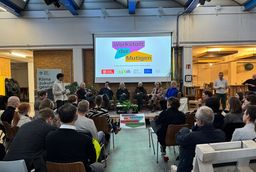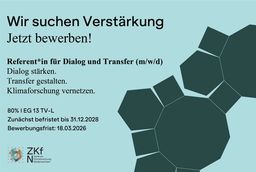Funding decision for the Climate Future Labs 2024 published
- June 26, 2024
- 5 min. Reading time

How can cities and forests be developed in a climate-adapted way? Four new future labs - Climate Future Labs - at the Lower Saxony Center for Climate Research (ZKfN) will be addressing this question in the future, for which the Lower Saxony Ministry of Science and Culture has now announced funding commitments totaling around 20 million euros. Two laboratories will each receive funding to conduct research on the topics of "Climate-adapted urban development and spatial planning" and "Effects of climate change on the forest ecosystem". The funded projects bring together cross-location consortia with scientists and practice partners from all over Lower Saxony and will begin their work in the coming months. The funds come from the zukunft.niedersachsen program.
"All 14 submitted projects show the great potential of climate and climate impact research in Lower Saxony and the expertise we can build on in the coming years in this important present and future field. The climate future laboratories that have now been selected will help us to develop solutions to the challenges of climate change. The Braunschweig region in particular has made a strong contribution to the call for proposals and is involved in a total of 8 applications," explains Falko Mohrs, Lower Saxony's Minister for Science and Culture.
Katharina Zickwolf, Managing Director of the Lower Saxony Center for Climate Research, on the funding decision: "The launch of the first four Climate Future Labs also marks the start of research work at the ZKfN. I would therefore like to extend a warm welcome to all the scientists in the labs and I am particularly pleased that we can work together at the ZKfN to shape a climate-friendly future for all of us in Lower Saxony."
The inter- and transdisciplinary Climate Future Labs are each funded with up to five million euros from the zukunft.niedersachsen program of the Lower Saxony Ministry of Science and Culture and the Volkswagen Foundation. The funding period for the Climate Future Labs is six years, subject to a positive interim evaluation.
The funded Climate Future Labs of the priority area "Climate-adapted Urban Development and Spatial Planning":
The "URBAN CLIMATE FUTURE LAB" project brings together a consortium of scientists* from Technische Universität Braunschweig, Leibniz Universität Hannover, Leuphana Universität Lüneburg as well as the Academy for Spatial Development in the Leibniz Association and the Helmholtz-Zentrum Hereon GmbH. In two phases, the lab aims to research and strengthen the climate resilience and sustainability of urban systems in Lower Saxony. In the first phase, different types of settlements will be investigated in terms of their contribution to climate change and how they are affected by its consequences. Subsequently, the second phase of the project will develop transformation options for these types of settlements to make them more resilient and sustainable, with the involvement of various stakeholder groups such as citizens.
As the second new Climate Future Lab focusing on climate-friendly urban development, "OPEN CULTURES" consists of scientists from Technische Universität Braunschweig, the Julius Kühn Institute and the Carl von Ossietzky University of Oldenburg. The focus of this project is to investigate how climate knowledge can be translated into sustainable living for residents through design principles that take climate-adapted urban development and spatial planning into account. The lab aims to address this translation gap and builds on neighborhood development projects such as the CO_LIVING Campus in Braunschweig.
The funded projects in the focus area "Effects of Climate Change on the Forest Ecosystem":
"FoResLab" is a consortium of the Georg August University Göttingen, the HAWK - University of Applied Sciences and Arts Hildesheim/Holzminden/Göttingen, the Julius Kühn Institute, the Leibniz University Hannover, the Luxembourg Institute of Science and Technology, the Northwest German Forest Research Institute Göttingen and the TU Braunschweig. Together, the consortium wants to investigate the question of how forests can be made resilient to climate change. To this end, the "ForResLab" scientists want to combine interdisciplinary and transdisciplinary research with science communication and knowledge transfer formats.
The Climate Future Lab "DIVERSA" consists of scientists from the Northwest German Forest Research Institute Göttingen, the Georg August University Göttingen, the Leuphana University Lüneburg, the Alfred Toepfer Academy for Nature Conservation as well as the Center for Biological Diversity, the Technische Univeristät München and the University of Utrecht in the Netherlands as external partners. Together, they want to research and evaluate the resilience of German forests to stress factors such as drought, heat, etc. Based on the project results, existing instruments for monitoring, decision support and management of Lower Saxony's forests will be further developed.
About zukunft.niedersachsen
zukunft.niedersachsen (formerly "Niedersächsisches Vorab") is a science program of the Lower Saxony Ministry of Science and Culture and the Volkswagen Foundation. The majority of zukunft.niedersachsen's funding comes from the equivalent value of the annual dividend on a nominal 30.2 million VW trust shares held by the state of Lower Saxony, which are subject to the profit transfer claim to the Volkswagen Foundation. According to the statutes, the funds are to be allocated to scientific institutions in the state of Lower Saxony. To this end, the state government usually submits proposals for the use of funds to the Foundation's Board of Trustees in the summer and fall. In addition, a one-off special dividend of 576.3 million euros from the IPO of Porsche AG was added in 2023. This amount will also be used for the zukunft.niedersachsen program in the coming years. In 2023, a total of 510.5 million euros flowed into Lower Saxony's research and science. One of the funded projects is the new future lab Circular Economy at ZDIN. Further information on "zukunft.niedersachsen" can be found at www.zukunft.niedersachsen.de.
You will find the complete press release with all information here (in German).
More Posts
All
Taking a holistic approach to climate adaptation in cities
Interview with UMEX-HOPE speaker Prof. Dr. Björn Maronga
7 min. Reading time
Big visions, but quick small steps
Social sustainability arises when different actors take responsibility, act together, and combine big visions with concrete, small steps.
4 min. Reading time
Job opening at the ZKfN
The ZKfN is looking for a dialogue and transfer officer to strengthen the exchange between science and society in climate and climate research in Lower Saxony.
1 min. Reading time